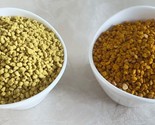BEE POLLEN Pure Natural Not Processed Bee Pollen Granules Yellow and Brown
Uses and Potential Benefits
Bee pollen has been used for various purposes, with some
studies exploring its potential benefits, although more research is
needed. It has been investigated for its effects on cholesterol levels,
with some animal studies suggesting it may help lower
cholesterol. Additionally, bee pollen has been studied for benign
prostatic hyperplasia (BPH), with some small studies showing improvements in
urine flow and reduced urinary retention.
Furthermore, bee pollen has been linked to potential
benefits in male fertility, with studies indicating positive effects on sperm
production and sperm cell life, as well as reducing oxidative stress and
inflammation. It has also been studied for polycystic ovarian syndrome
(PCOS)-related infertility, with bee products showing potential to relieve
several symptoms when combined with medications or used alone. Some
studies have also explored its use in managing menopausal symptoms, such as hot
flashes, with some relief reported in individuals undergoing antihormonal
therapy for breast cancer.
Bee pollen is also a source of various nutrients and
antioxidants. It contains vitamins, including B vitamins, vitamin A, and
vitamin C, which play crucial roles in various bodily functions It also
contains antioxidants like flavonoids, polyphenols, and carotenoids, which can
help protect cells from damage
Nutritional Composition
Bee pollen is a rich source of nutrients, including
proteins, amino acids, lipids, carbohydrates, minerals, vitamins, and polyphenols. The
exact composition varies depending on the plant source and environmental
factors. On average, bee pollen contains about 22.7% protein, including
essential amino acids, and 30.8% carbohydrates, mainly glucose and
fructose It also contains lipids, including essential fatty acids, and
phenolic compounds like flavonoids.
Safety and Precautions
While generally well-tolerated, bee pollen can cause side
effects Common side effects include upset stomach and tingling sensations. Severe
allergic reactions are possible, especially in individuals with pollen
allergies or bee sting allergies, and can include breathing difficulties,
itchiness, and rash. Bee pollen may also contain contaminants like
pesticides, and pollen from certain plants may cause liver problems.
It is not recommended for use during pregnancy or
breastfeeding due to limited safety data. Children
should also consult with a healthcare provider before use. Individuals
with liver problems should also exercise caution. Bee
pollen may interact with medications like warfarin, potentially increasing the
risk of bleeding.
Dosage
There is no established standard dosage for bee pollen, and
it is available in various forms, including capsules and granules, It is
recommended to consult with a healthcare provider to determine the appropriate
dosage for individual needs.
Forms and Sources
Bee pollen is available in various forms, including
capsules, tablets, granules, and powders. It is also found in pollen-based
foods like baked goods and meat products. The
source of bee pollen can vary, and it is essential to consider the origin and
processing methods when choosing a product.
Bee pollen is a natural product with a rich nutritional
profile, but its use should be approached with caution.
Brown bee pollen is sweet and a little spicy.
Yellow bee pollen is sweet.
